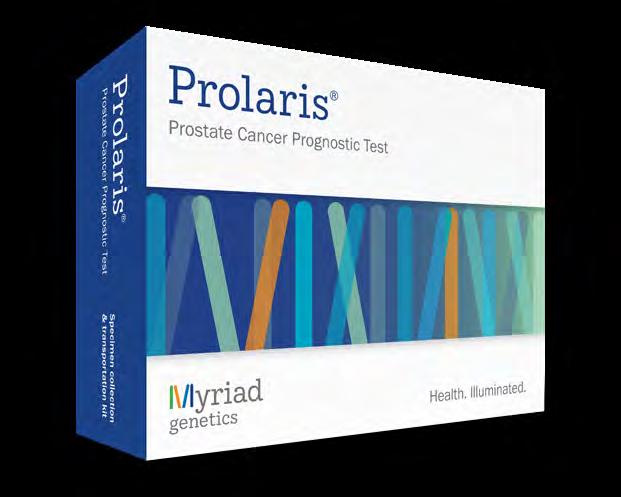Personalized prostate cancer care begins
with Prolaris
Prolaris
Confused about which prostate cancer treatment is right for you?
There are so many prostate cancer treatment options available and deciding what to do next can be confusing. You want to be confident your doctor is recommending the best treatment option for your unique cancer. The Prolaris® test is a personalized genetic test that looks at the aggressiveness of your tumor, helping you and your doctor decide which treatment option is best.
Patient profiles
Who is Prolaris for?
• Age 62
• Gleason 3+3
• Wants to know if he can safely monitor his cancer and avoid surgery
Is Prolaris testing right for
• Age 70
John
• Age 67
• Gleason 3+4
• Trying to decide if he actually needs multiple forms of treatment
• Gleason 4+3
• Trying to decide if hormone therapy (ADT) is needed after radiation
me?
The Prolaris test is for any untreated man with localized prostate cancer or men on active surveillance and helps you answer your most pressing questions like:
•Am I safe for active surveillance or do I need treatment?
•Is my cancer at risk of spreading outside my prostate?
•What are my chances of surviving prostate cancer?
•Can I benefit from adding hormone therapy (ADT) to radiation or can I safely avoid the side-effects of ADT?
Hector
Bill
The Prolaris ® test is the most comprehensive test available
Diagnostic tools like PSA and Gleason grading can only give you a snapshot of where your cancer is right now. The Prolaris test looks at how quickly your cancer is growing to help you know where your cancer is headed so you can personalize your treatment.
Go beyond Gleason for treatment decisions
Biomarker tests like Prolaris are supported by major prostate cancer treatment guidelines and should be ordered on every appropriate cancer patient.
Personalized insights at first cancer consult
Know your risk of dying from prostate cancer
Know your risk of cancer spreading (Metastasis)
Understand if you qualify for active surveillance
Understand if you need single or multiple forms of treatment
Quantify personal benefit of adding hormone therapy (ADT) to radiation therapy (RT)
In two clinical studies, Prolaris test results led to changes in treatment management for up to 65% of patients.17-19
The Prolaris ® test was made with patients in mind
1: Prolaris Molecular Score
Personalized tumor aggressiveness score
2: Risk Assessment
Clinical variables are combined with the Prolaris score to calculate your individualized cancer assessment
3: Personalized recommendations for treatment planning
4: Disease Specific Mortality (DSM)
10-year risk of prostate cancer specific death when choosing no treatment (Active Surveillance)
5: Metastatic Risk
10-year risk of cancer spreading when choosing a definitive treatment, like surgery or radiation
6: *NEW* Absolute Risk Reduction (ARR)
Personalized risk reduction of metastasis over 10 years when adding hormone therapy to radiation
“The presentation and the layout of the Prolaris report has absolutely changed the way that I speak to my patients in giving biopsy results. One of the first things I do when I walk into the room is put it on the screen and we review it together."
- Ashleigh Renitsky, Oncology PA
The Prolaris ® Advantage
When
it comes to making active surveillance or definitive treatment decisions, selecting the correct test matters.
Product Comparison
Can the test predict the risk of death from prostate cancer if the patient is choosing active surveillance?
Was the active surveillance threshold validated on a group of untreated patients?
Combines Gleason score and PSA with a personalized cancer aggressiveness score
Can the test predict risk of cancer spreading outside the prostate after treatment?
Does the test give a personalized risk number from adding hormone therapy (ADT) after radiation therapy?
“We use Prolaris testing on all our patients, it has the best data for us in terms of actionable information as to who needs active surveillance, who needs actual treatment, and the intensity of the treatment."
- Dr. Angelo Baccala, Chief Urologist
Artera3,4 Decipher5-9 GPS10 Prolaris2, 11-14
Your options become clearer with the Prolaris ® test
2x the predictive power of PSA and Gleason combined1
Outperforms all other biomarkers in active surveillance18
Only test developed and validated on untreated men17
Most comprehensive: combines genomic, PSA and Gleason scores1
Goes beyond risk stratification to determine which patients need treatment and the appropriate level of intensity
How much will my test cost?
Personalizes ADT decisions for every patient
Many people have insurance that covers Myriad products and the exact amount you owe can vary based on your plan or your individual financial situation.
When it comes to finding the best tool to bring clarity, utility and personalization to your prostate cancer treatment, choose Prolaris.
1. Cuzick J, et al. Prognostic value of a cell cycle progression signature for prostate cancer death in a conservatively managed needle biopsy cohort. BJC 2012;106(6):1095-109
2. Hutten RJ, Odei B, Johnson SB, Tward JD: Validation of the Combined Clinical Cell-Cycle Risk Score to Prognosticate Early Prostate Cancer Metastasis From Biopsy Specimens and Comparison With Other Routinely Used Risk Classifiers. JCO Precis Oncol 8:e2300364, 2024
3. Esteva A, Feng J, van der Wal D, et al: Prostate cancer therapy personalization via multi-modal deep learning on randomized phase III clinical trials. npj Digital Medicine 5:71, 2022
4. Spratt DE, Tang S, Sun Y, et al: Artificial Intelligence Predictive Model for Hormone Therapy Use in Prostate Cancer. 4. Res Sq, 2023
5. Nguyen PL, Haddad Z, Ross AE, et al: Ability of a Genomic Classifier to Predict Metastasis and Prostate Cancer-specific Mortality after Radiation or Surgery based on Needle Biopsy Specimens. Eur Urol 72:845-852, 2017
6. Spratt DE, Zhang J, Santiago-Jiménez M, et al: Development and Validation of a Novel Integrated Clinical-Genomic Risk Group Classification for Localized Prostate Cancer. J Clin Oncol 36:581-590, 2018
7. Klein EA, Haddad Z, Yousefi K, et al: Decipher Genomic Classifier Measured on Prostate Biopsy Predicts Metastasis Risk. Urology 90:148-152, 2016
8. Spratt DE, Huang H-C, Michalski JM, et al: Validation of the performance of the Decipher biopsy genomic classifier in intermediate-risk prostate cancer on the phase III randomized trial NRG Oncology/RTOG 0126, American Society of Clinical Oncology, 2022
9. Berlin A, Murgic J, Hosni A, et al: Genomic Classifier for Guiding Treatment of Intermediate-Risk Prostate Cancers to Dose-Escalated Image Guided Radiation Therapy Without Hormone Therapy. International Journal of Radiation Oncology*Biology*Physics 103:84-91, 2019
10. Cullen J, Kuo HC, Shan J, et al: The 17-Gene Genomic Prostate Score Test as a Predictor of Outcomes in Men with Unfavorable Intermediate Risk Prostate Cancer. Urology 143:103-111, 2020
11. Canter DJ, Freedland S, Rajamani S, et al: Analysis of the prognostic utility of the cell cycle progression (CCP) score generated fromneedle biopsy in men treated with definitive therapy. Prostate Cancer and Prostatic Diseases 23:102-107, 2020
12. Canter DJ, Reid J, Latsis M, et al: Comparison of the Prognostic Utility of the Cell Cycle Progression Score for Predicting Clinical Outcomes in African American and Non-African American Men with Localized Prostate Cancer. European Urology 75:515-522, 2019
13. Tward J, Lenz L, Flake II DD, et al: The clinical cell-cycle risk (CCR) score is associated with metastasis after radiation therapy and provides guidance on when to forgo combined androgen deprivation therapy with dose-escalated radiation. International Journal of Radiation Oncology* Biology* Physics 113:66-76, 2022
14. Tward JD, Schlomm T, Bardot S, et al: Personalizing localized prostate cancer: validation of a combined clinical cell-cycle risk (CCR)score threshold for prognosticating benefit from multimodality therapy. Clinical genitourinary cancer 19:296-304. e3, 2021
15. Brawer MK, Cooperberg MR, Freedland SJ, et al: Development and validation of a multivariate model combining cell cycle progression score with CAPRA to predict prostate cancer mortality in a conservatively managed cohort. Journal of Clinical Oncology31:67-67, 2013
16. Spratt DE, Dess RT, Efstathiou JA, et al: Two Years of Anti-Androgen Treatment Increases Other-Cause Mortality in Men Receiving Early Salvage Radiotherapy: A Secondary Analysis of the NRG Oncology/RTOG 9601 Randomized Phase III Trial. International Journal of Radiation Oncology • Biology • Physics 105:680, 2019
17. Lin, D. W., et al. Identification of men with low-risk biopsy-confirmed prostate cancer as candidates for active surveillance. Urologic Oncology: Seminars and Original Investigations. 2018; doi: 10.1016/j.urolonc.2018.03.011.
18. Crawford ED, Scholz MC, Kar AJ, et al. Cell Cycle Progression Score and Treatment Decisions in Prostate Cancer:Results From an Ongoing Registry. Curr Med Res Opin 2014; 1-7
19. Shore, N D., et al. Impact of the cell cycle progression test of physician and patient treatment selection for localized prostate cancer. The Journal of Urology 2016;195(3),612- 618
Myriad Genetics, Inc.
320 Wakara Way
Salt Lake City, UT 84108
Myriad, the Myriad logo, Prolaris, and the Prolaris logo are either trademarks or registered trademarks of Myriad Genetics, Inc. in the United States and other jurisdictions. ©2023, Myriad Genetic Laboratories, Inc.










